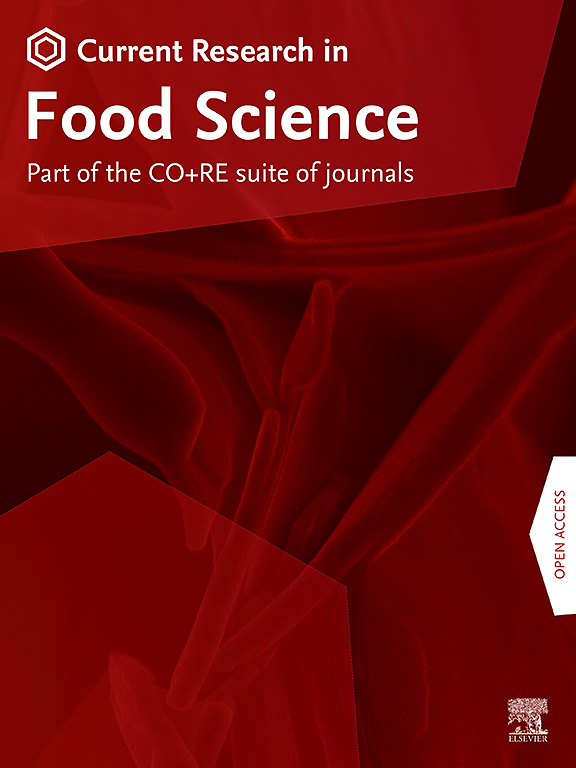Utilizing kombucha culture for coffee fermentation and biochemical characteristic analysis
IF 6.2
2区 农林科学
Q1 FOOD SCIENCE & TECHNOLOGY
引用次数: 0
Abstract
Coffee, an important global commodity, is grown on 10.2 million hectares in over 80 countries. Arabica coffee (Coffea arabica) is popular worldwide due to its superior flavour. As consumer interest in coffee flavour and quality continues to grow, this study aims to enhance the bioactive compounds, functionality, and sensory properties of Arabica coffee (Coffea arabica) by fermentation with black tea kombucha (K-coffee) and coffee kombucha (CK-coffee). Coffee showed a decrease in pH and an increase in titratable acidity during fermentation. The total phenolic and flavonoid content increased 1.77- and 1.95-fold in K-coffee and 2.07- and 2.60-fold in CK-coffee, respectively, after 24 h of fermentation compared to the coffee control, in which the kombucha broth was not inoculated, with an increased in trigonelline, chlorogenic acid and caffeic acid content. The caffeine content in CK-coffee increased 1.33-fold after 12 h of fermentation and remained relatively stable in K-coffee up to 24 h of fermentation compared to the coffee control. The antioxidant activity and inhibitory effect against α-glucosidase of fermented coffee increased to 2.24- and 2.40-fold after 24 h of fermentation, respectively, compared to the coffee control. Sensory evaluation highlighted noticeable differences in flavour among unfermented coffee, K-coffee, and CK-coffee with changes in volatile aroma compounds. These results support the feasibility of kombucha fermentation as a novel approach to develop specialty coffees with enhanced flavour and nutritional profiles.

利用康普茶培养物进行咖啡发酵及生化特性分析
咖啡是一种重要的全球商品,在80多个国家种植了1020万公顷。阿拉比卡咖啡(Coffea Arabica)因其优越的风味而享誉全球。随着消费者对咖啡风味和品质的兴趣不断增长,本研究旨在通过与红茶康普茶(K-coffee)和咖啡康普茶(CK-coffee)发酵来提高阿拉比卡咖啡(Coffea Arabica)的生物活性化合物、功能和感官特性。在发酵过程中,咖啡的pH值下降,可滴定酸度增加。发酵24 h后,与未接种康普茶的对照相比,k -咖啡的总酚和类黄酮含量分别增加了1.77倍和1.95倍,ck -咖啡的总酚和类黄酮含量分别增加了2.07倍和2.60倍,葫芦巴碱、绿原酸和咖啡酸含量均有所增加。发酵12 h后,k -咖啡中的咖啡因含量增加了1.33倍,发酵24 h后,k -咖啡中的咖啡因含量相对稳定。发酵24 h后,发酵咖啡的抗氧化活性和对α-葡萄糖苷酶的抑制作用分别比对照提高了2.24倍和2.40倍。感官评价突出了未发酵咖啡、k -咖啡和ck -咖啡在挥发性香气化合物变化方面的显著差异。这些结果支持了康普茶发酵作为一种开发具有增强风味和营养特征的特色咖啡的新方法的可行性。
本文章由计算机程序翻译,如有差异,请以英文原文为准。
求助全文
约1分钟内获得全文
求助全文
来源期刊

Current Research in Food Science
Agricultural and Biological Sciences-Food Science
CiteScore
7.40
自引率
3.20%
发文量
232
审稿时长
84 days
期刊介绍:
Current Research in Food Science is an international peer-reviewed journal dedicated to advancing the breadth of knowledge in the field of food science. It serves as a platform for publishing original research articles and short communications that encompass a wide array of topics, including food chemistry, physics, microbiology, nutrition, nutraceuticals, process and package engineering, materials science, food sustainability, and food security. By covering these diverse areas, the journal aims to provide a comprehensive source of the latest scientific findings and technological advancements that are shaping the future of the food industry. The journal's scope is designed to address the multidisciplinary nature of food science, reflecting its commitment to promoting innovation and ensuring the safety and quality of the food supply.
 求助内容:
求助内容: 应助结果提醒方式:
应助结果提醒方式:


